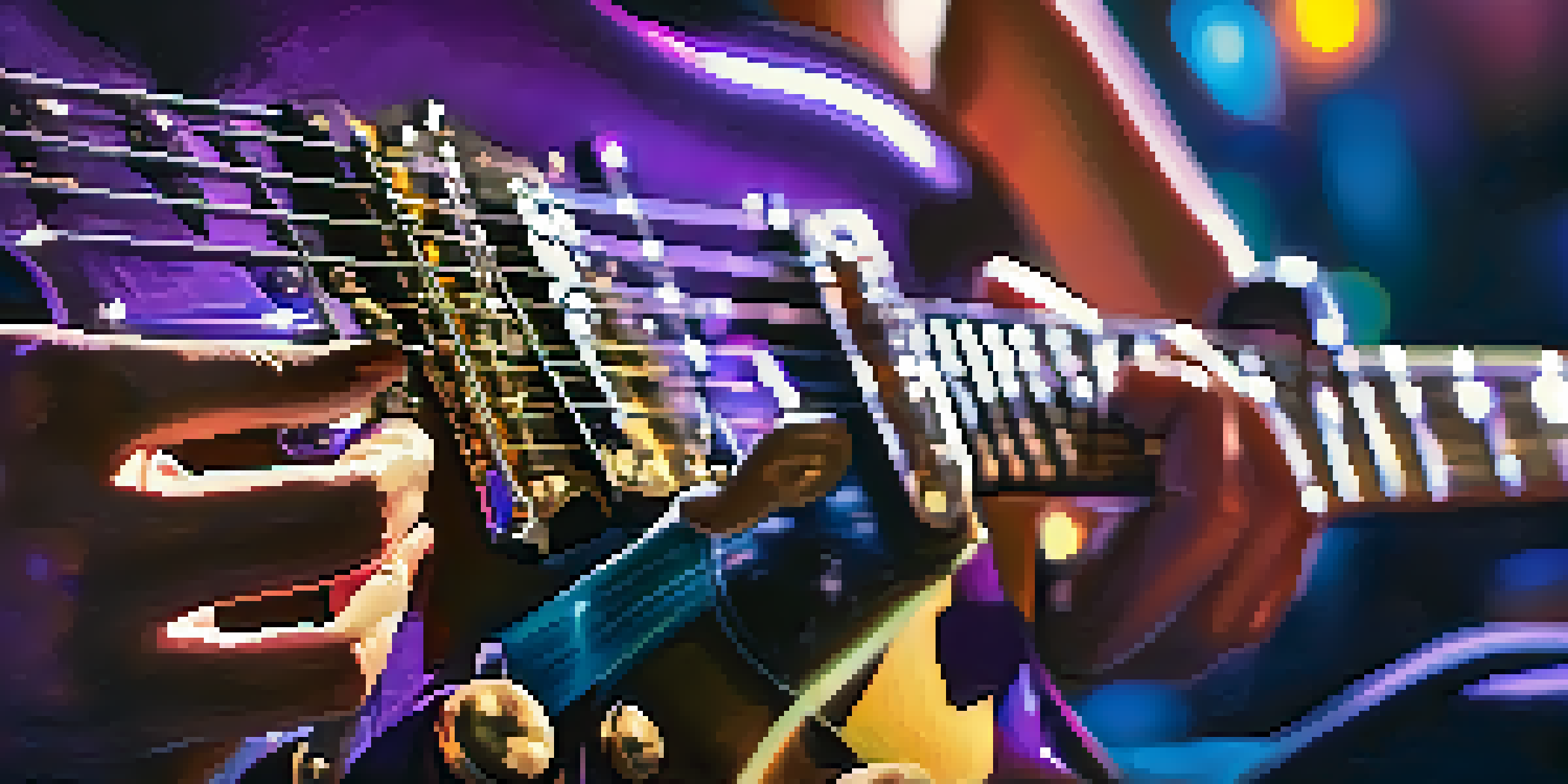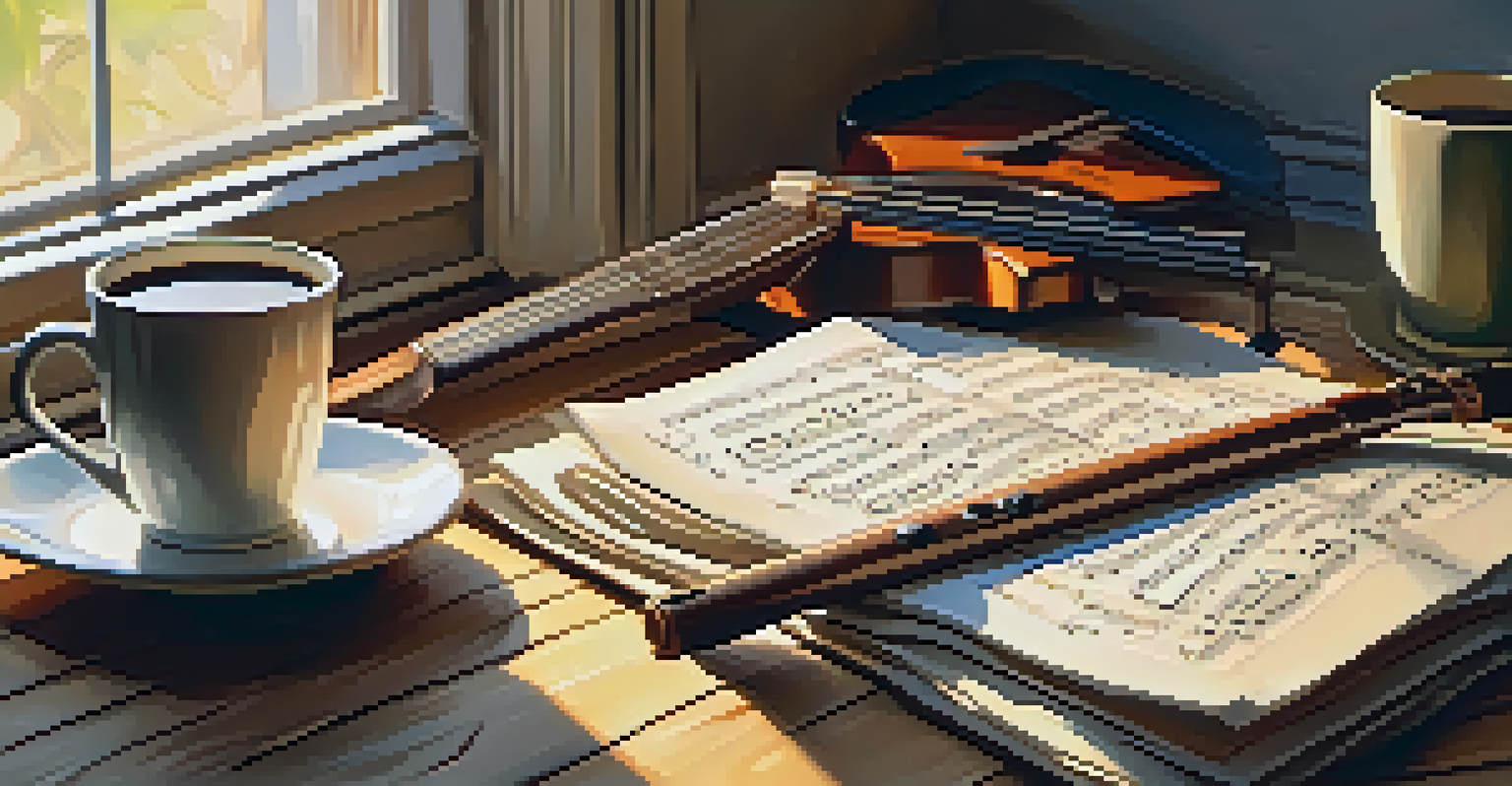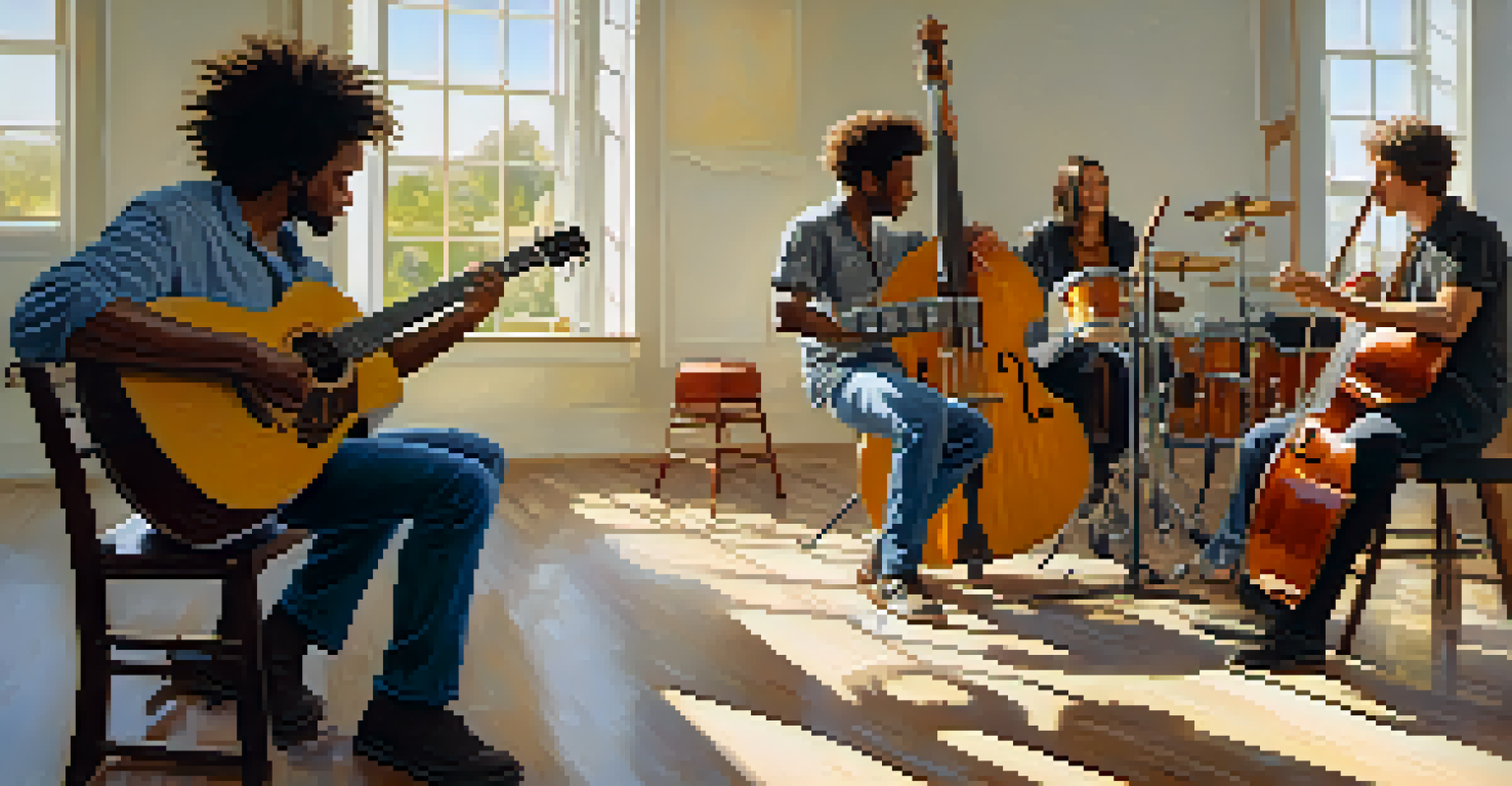Developing Your Ear for Improvisation on the Guitar

Understanding the Basics of Musical Improvisation
Improvisation is the art of creating music on the spot, allowing musicians to express themselves spontaneously. For guitarists, it’s about weaving melodies and harmonies that resonate with their unique style. Knowing the basics of scales and chords is essential, as they serve as the building blocks for effective improvisation. Think of improvisation as a conversation with your instrument—each note is a word, and together, they form a dialogue.
Improvisation is the ability to create something new and innovative in the moment.
When you improvise, you're essentially telling a story through your guitar. Just like a good storyteller knows their characters and plot, a guitarist should be familiar with different scales, such as the major and minor scales, and how they relate to the chords being played. This foundational knowledge allows you to navigate through different musical ideas fluidly. The more you practice, the more natural this dialogue becomes.
Improvisation is a skill that can be developed over time with patience and practice. It requires both technical proficiency and an understanding of music theory. So, let’s dive into how you can develop your ear, which is crucial for improvisation, and make your guitar speak.
Listening: The Key to Developing Your Musical Ear
Listening is perhaps the most important skill a musician can develop, especially for improvisation. By actively listening to different genres and styles, you can start to identify patterns, rhythms, and phrases that resonate with you. This exposure helps you internalize what you hear, which you can later replicate on your guitar. Think of it as training your brain to recognize musical language.

One effective way to enhance your listening skills is to transcribe solos from your favorite guitarists. By figuring out what they play note for note, you'll not only improve your ear but also learn new techniques and styles. You can start by picking simple solos and gradually move to more complex ones. This exercise essentially helps you 'speak' the language of music more fluently.
Improvisation as Musical Dialogue
Improvisation allows musicians to create spontaneous musical conversations by using scales and chords as their vocabulary.
Moreover, don’t hesitate to explore music outside your comfort zone. Listening to jazz, blues, rock, or even classical music exposes you to a variety of improvisational techniques. Each genre has its own unique approach to improvisation, and understanding these differences can inspire new ideas in your playing.
Practicing Scales: Building Blocks for Improvisation
Scales are the foundation of improvisation, acting like a map for your musical journey. Practicing scales regularly helps you familiarize yourself with the fretboard and develop muscle memory. The major and minor pentatonic scales are particularly useful for guitarists as they provide a versatile palette for improvisation. Visualizing these scales across the fretboard can empower you to express your musical ideas more freely.
There are no mistakes, only opportunities.
To make scale practice more engaging, try improvising over backing tracks. Start with a simple scale and play along, allowing yourself to experiment with different note combinations. As you become comfortable, you can gradually incorporate more complex scales and rhythms. This practice not only strengthens your technical skills but also enhances your creative expression.
Remember, improvisation is not about playing every note perfectly; it’s about the emotion and story you convey through your music. By mastering scales, you’re essentially equipping yourself with the tools to tell your story in a compelling way. So, take the time to explore and enjoy the process!
Experimenting with Chord Progressions
Chord progressions form the harmonic backbone of most songs, and understanding them is vital for improvisation. Experimenting with different progressions can reveal new pathways for your solos. For example, try improvising over a simple I-IV-V progression, which is common in many genres. This exercise allows you to focus on melody while staying grounded in harmony.
As you experiment, consider how different chord voicings can alter the mood of your improvisation. A major chord might evoke happiness, while a minor chord can bring a more somber tone. By varying the chords you use, you can create diverse emotional landscapes within your solos. This dynamic interplay between chords and melodies is what makes improvisation so captivating.
Listening Enhances Musical Skills
Active listening and transcribing solos from other musicians are vital for developing your ear and improving improvisational techniques.
Don’t be afraid to create your own progressions, either! Jamming with friends or using a loop pedal can inspire spontaneity and innovation. The more you experiment, the more you’ll discover what resonates with your style, leading to richer improvisational experiences.
Incorporating Rhythm and Timing into Your Playing
Rhythm and timing are just as crucial as melody when it comes to improvisation. A well-timed note can elevate a simple idea into something extraordinary. Practicing with a metronome or playing along with a rhythm section will help you develop a strong sense of timing. Remember, it’s not just about hitting the right notes; it’s about how you express them in relation to the beat.
To explore rhythm further, try experimenting with different rhythmic patterns. For instance, you can play a note on the beat, then try off-beat variations or syncopation. This exploration adds depth and interest to your improvisation, making it more engaging for both you and your audience. Think of rhythm as the heartbeat of your musical expression.
Moreover, studying different styles of music can expose you to various rhythmic concepts. For example, jazz often incorporates swing rhythms, while funk focuses on tight, syncopated patterns. By integrating these elements into your playing, you’ll not only enhance your improvisational skills but also expand your overall musicianship.
Embracing Mistakes: Part of the Learning Process
Improvisation can be intimidating, and the fear of making mistakes often holds musicians back. However, embracing mistakes is crucial for growth. Every misstep can lead to unexpected discoveries and new musical ideas. Instead of viewing mistakes as failures, consider them opportunities to learn and evolve as a guitarist.
When you hit a 'wrong' note, try to incorporate it into your improvisation. This approach can spark creativity and lead to unique musical phrases. Often, what feels like a mistake in the moment can turn into a signature sound with some experimentation. Remember, many great musicians have built their styles on happy accidents!
Embrace Mistakes for Growth
Viewing mistakes as opportunities can lead to unique musical discoveries and foster confidence in your improvisational journey.
As you practice improvisation, remind yourself that everyone makes mistakes, even the pros. The key is to stay confident and keep playing. Over time, you’ll find that your willingness to take risks will lead to more satisfying and authentic performances.
Putting It All Together: The Joy of Improvisation
The beauty of improvisation lies in its spontaneity and freedom. By developing your ear, practicing scales, experimenting with chords, and embracing mistakes, you’re well on your way to creating your own unique musical voice. Each practice session is an opportunity to express yourself and explore new ideas. Remember, improvisation isn’t just about technical skills; it’s about feeling and connection.
As you begin to put all these elements together, don't forget to have fun! Jam with friends, play at open mics, or simply enjoy playing in your living room. The more you share your music with others, the more you’ll grow as an improviser. Each performance is a chance to communicate your emotions and stories through your guitar.

Ultimately, the journey of developing your ear for improvisation is an ongoing process. Stay curious, keep experimenting, and let your creativity flow. With time and practice, you'll discover that improvisation is not just a skill but a joyous expression of who you are as a musician.